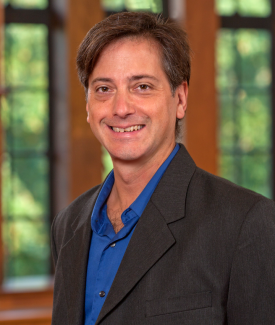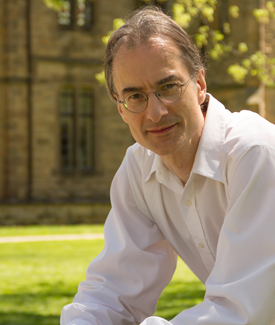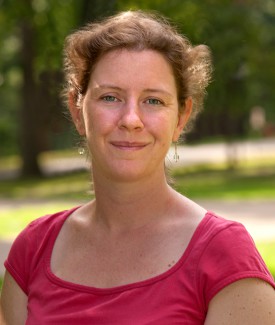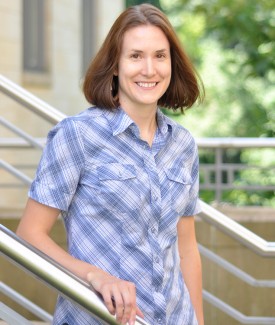Awarded Tenure
From Kenyon News - April 24, 2017
Four members of the Kenyon faculty were awarded tenure, or appointment without limit, by action of the Kenyon Board of Trustees on April 21. These members of the faculty are promoted to associate professor from assistant professor, effective on July 1, and they include:

Ross Feller, assistant professor of music
B.A. American Conservatory of Music, Chicago
M.A. and Ph.D. University of Illinois at Urbana-Champaign
Ross Feller joined the Kenyon College faculty after having taught at the Oberlin College Conservatory of Music. His research interests include the cognition and embodiment of sound, the impact of technology on compositional praxis, semiotics, composition, computer music, rock, jazz and improvisation. He has published book chapters with Cambridge University Press, Routledge, and Schott, articles and reviews in journals such as the Computer Music Journal and ex tempore and has presented papers at music theory and interdisciplinary conferences in the Netherlands, the United Kingdom, Germany, Switzerland, Finland, Canada and the U.S. A recent recipient of the Ohio Arts Council Individual Excellence Award for Composition, he has also received awards and grants for his compositions from the Gaudeamus Foundation, ASCAP, Illinois Arts Council, Bent Frequency, and Ingenuity: Cleveland's Festival of the Arts, Music, and Technology. As a saxophonist he has specialized in contemporary classical repertoire, improvisation, extended techniques and jazz. With Kenyon College dance professor Kora Radella he co-founded Double-Edge Dance, a contemporary dance and music company for which he has composed many works. Feller also serves as the review editor for the Computer Music Journal and often adjudicates competitions such as the MTNA Ohio Music Teachers Association Young Composers Competition.

Hans Lottenbach, assistant professor of philosophy
B.A. University of Zurich, Switzerland, Ph.D. University of Pittsburgh
Hans Lottenbach joined the Kenyon faculty in 2010. Before coming to Kenyon he taught philosophy at the University of Pittsburgh, Princeton University and UCLA. Professor Lottenbach teaches courses on 19th-century philosophy, political philosophy and the philosophy of Kant, among other topics. He has published articles on the philosophy of Hegel, Hume, Locke and Kant in edited volumes and journals such as Hegel-Jahrbuch, Locke Studies and the Canadian Journal of Philosophy. His current research interest is in the practical philosophy of German Idealism and its relation to modern metaphysics.

Rosemary O'Neill, assistant professor of English
B.A. University of Chicago, Ph.D. University of Pennsylvania
Rosemary O'Neill joined the Department of English at Kenyon in 2011 after teaching at Haverford College and the University of Pennsylvania. Her research and teaching take up the literature of later medieval England, with a particular interest in how religious practices shaped the poetry of writers such as Chaucer, Langland and the Pearl-Poet. At Kenyon, she teaches courses on medieval drama, medieval women writers, literature and religion in medieval England, and a first-year seminar investigates the topic of marriage in literature from Plato to the present. She is completing a book project that explores the medieval image of the individual conscience as an account book, arguing that discourses of salvation in medieval England were shaped by divergent traditions of financial accounting. A new project investigates the history of the concept of family in Middle English literature. Her research has been supported by grants from the British Academy and the Medieval Academy. She recently won the 2017 Van Courtlandt Elliott prize from the Medieval Academy for the best first article in the field of medieval studies published in a scholarly journal.

Kerry Rouhier, assistant professor of chemistry
B.A. Aquinas College, Ph.D. Miami University Oxford
Kerry Rouhier joined the Kenyon faculty in 2010 after working at Doane College in Nebraska as a post-doctoral associate. While at Doane she worked on several different research projects including synthesis of fluorescent compounds, small molecule detection systems and student understanding in spatial reasoning. However, by nature, she is a biochemist. Here at Kenyon, Rouhier's lab is investigating metabolic pathways related to branched-chain amino acids. They perform techniques such as nuclear magnetic spectroscopy, liquid chromatography-mass spectrometry and gas chromatography-mass spectrometry to provide a "map" of metabolic pathways within a particular biological system. Her teaching interests include introductory lecture and lab courses as well as advanced courses related to biochemistry.